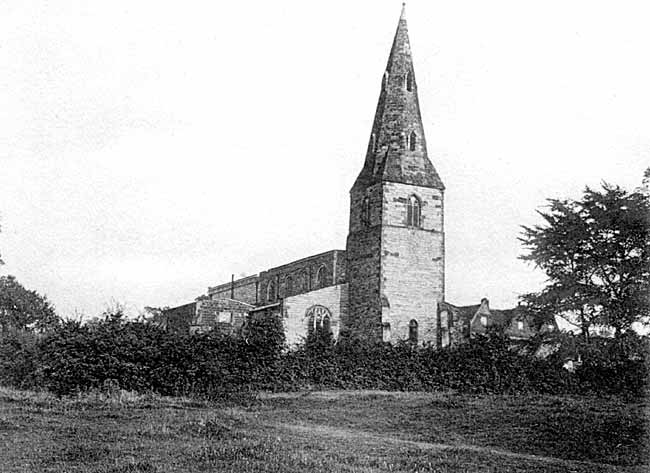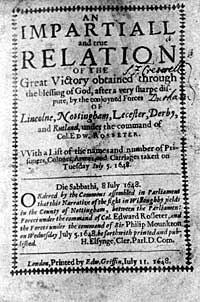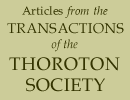The Fight at Willoughby Field
5th July 1648.
BY MR. GEORGE FELLOWS.

Willoughby church.
AMONG other places visited by the Thoroton Society on the occasion of the Spring Excursion on the 27th May, 1902, was Willoughby-on-the-Wolds, when a short summary of the account of this combat, as given in Mr. C. H. Firth's " Memoirs of Colonel Hutchinson," was read in the churchyard, which overlooks the meadow where local tradition says the fight took place.
A more detailed account than that read in 1902 can now be furnished, as Mr. T. M. Blagg, F.S.A., has for this purpose kindly loaned his copy of that very scarce war tract, which contains the narrative of this fight, as ordered to be printed by the Commons immediately after its occurrence. This authentic account also appears as an appendix in the Monckton Papers, in the preface to which Lord Houghton refers to this tract as being of “exceeding rarity.”
A paper on this event has appeared in the journal of the Leicestershire Architectural and Archaeological Society; seeing, however, that the actual combat took place, and the movements of the opposing forces during several days prior to their encountering one another spread over a considerable area of Nottinghamshire soil, a detailed narrative of this stubborn combat may advantageously appear in the pages of the Transactions of the Antiquarian Society of Nottinghamshire.
“AN Impartial and true relation of the Great Victory obtained through the blessing of God, after a very sharpe dispute, by the conjoined Forces of Lincolne, Nottingham, Leicester, Derby and Rutland under the command of Col. Edw. Rosseter, with a List of the names and number of Prisoners, Colours, Armes, and Carriages taken on Tuesday July 5., 1648.
“Die Sabbathi, July 8, 1648.
“Ordered by the Commons assembled in Parliament that this Narrative of the fight in Willoughby fields in the County of Nottingham between the Parliament Forces under the command of Col. Edward Rosseter and the Forces tinder the command of Sir Philip Mounkton on Wednesday July 5th, 1648 be forthwith printed and published
H. Elsinge
Cler. Parl. D. Corn.
London. Printed by Edw. Griffin July 11 1648.”

Outside cover of war tract.
“On Fryday the 30 of June about 400 horse from Pomfret Castle most of them gentlemen of severall Countyes and Reformado officers and 200 Foot ferryed over Trent and made incursion into Lincolne-shire, marching forthwith to the City of Linc; where after they had by warrant under the hand of Sir Philip Monkton their Generall, released all the prisoners in the Castle for Debt, Murther, Felony and other crimes (who took up Armes presently with them). They went to the Bishops Pallace, wherein lay severall Armes, and some monyes of the Countryes: which place Capt. Bee, a wollen Draper of that City with 30 men had taken possession of and defended for 3 houres untill the Cavaliers had fired one part of the house. In which Capt. Bee resolved, and so told them, he would be consumed, unlesse he might surrender upon conditions propounded by him, amongst which the protection of his person and estate, the which they agreed too, no sooner was the Pallace delivered but all conditions broke, the Capt. seized and carryed away prisoner, untill released in the field at the following fight. All his wares and goods put in Carts with which and the Armes and mony found in the Pallace, together with the plunder, and persons of other honest men of the Towne they marched on Saturday night to Gainsborough 12 miles off.
“This Alarum coming that Friday night to Bevoyer Castle to Col. Rossiter (who was there upon some occasions of the country) he forthwith gave the alarum to Northampton, Leicester, Nottingham, Darby and Rutland and desired them to spare what horse they could, to joyne with a Troop of horse lately raised by him by authority of Parliament for the Security of that County, and he would therewith endeavour to drive the enemy out of the Countrey againe. The which forces being conjoined on Sabbath Evening, to the number of 550 (all of them newly raised men) and then understanding by a Letter received from Sir Henry Cholmely that 600 Yorkeshire horse with some Dragoones were on the North side of Trent about Gainsborrow, who would interrupt their retreating over Trent to Pomfret againe, or fight with them if they came over; Col. Rossiter marched on Munday morning towards Gainsborrow; In the midway thither, there met and joyned with him a Troop of horse from Lyn, which the Generall had put under the command of Capt. Tayler, who together refreshed that night in and about Waddington fields 3 miles South of Lincolne. On Tuesday morning by three a Clock, they marched through Lincolne towards Gainsborow, and understanding by a Lincolne man (who had been taken away prisoner by the Cavaliers and had escaped them that night) that the enemy were all drawn of from Gainsborow at 10 of the clock on Munday Evening and were marched towards Newark; Col. Rossiter forthwith pursued 18 miles that night, refreshed his horse 4 or 5 hours in the night in a meadow, a mile from Newark, where he received intelligence that the enemy quartered about Bingham, 6 miles before him; to this place came in to Rossiters further assistance about 150 horse, the one halfe from Derby and Rutland, the other halfe were Gentlemen and Freeholders of Lincolne, and Leicestershire, who voluntarily would adventure their lives for their Countryes freedome. On Wednesday morning Rossiter commanded out a forlorne hope 150 of the ablest horse, under the command of Capt. Champion of Nottingham-shire to pursue at a fast Rate, and so by falling on the enemies Reere to enforce them to a stand or halt, till he with the body of horse could come up to them. They after 7 miles advance overtooke the Reere of them, whom skirmishing with, made their body of horse and foot consisting of 7 or 800 at least, to draw up in a large Beane field belonging to Willoughby, 7 miles from Nottingham, on which Rossiter being informed from the commander of the forlorn, by marching at a full Trot (having no Dragoones or foot with him) within a short time brought his horse into the field himselfe commanding the right wing wherein he resolved to charge. But observing that the enemies strength was placed in their body, consisting of a party of foot winged with horse, and those horse flanked with Musketeers, and that with them the men of the best quallity (as appeared by their outward Garbes) seemed to he mounted; he resolved to Charge the Battaile, assigning his right wing to be commanded by Col. White, and the left wing be Col. Hacker, placing 2 reserves of horse in the Reere, being suddainly thus ordered, the enemies word (Jesus) and Rossiters (Fairefax) he advanced to the charge, who was received with much resolution. The bodies and reserves through eagernesse close together; whereby the encounter proved very sharpe, both sides falling presently to Swords point, and so continued in close fight neither party giving ground for some Space, till by the fiercenesse of each party both were put into disorder, being so intermixt doing execution each on other, the dispute continued a while doubtfull, at last it pleased God to give a full and absolute victory to Rossiters forces, as may appeare by the quallity and number of prisoners taken; all their Colours, Armes, and Carriages. About 200 that were best horsed (whereof diverse Papists) got off in small parties, severall of them wounded, but at least a hundred of them, were that night and next morning taken in their flight by Leicester, Belvoier, Burley and other honest country-men amongst whom was Sir Philip Mounkton their Generall disarmed and brought into Nottingham by Mr. Boyer a high Constable of that County, who deservedly now wears his sword.
